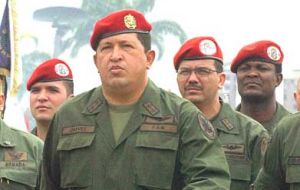MercoPress. South Atlantic News Agency
Chavez has plans to remain in office 22 years, until 2021
 In the best tradition of Caribbean power seeking leeders
In the best tradition of Caribbean power seeking leeders Venezuelan President Hugo Chavez has said he believes unlimited terms in office should only be granted to the president - not to the governors and mayors of Venezuela. If so Chavez could remain in office for 22 years until 2021.
In a national broadcast on Sunday, Mr. Chavez said his proposed constitutional reform would only abolish term limits for the office he holds, because local and state officeholders are involved in partisan politics as opposed to what he called "national integration". Chavez announced that in the coming days he would send the proposal to the National Assembly which once approved will be decided by a national referendum at the end of 2007. On recalling that next February he will be celebrating nine years in office (1999) Chavez said "prospects are that I will remain president until 2021", which adds up to 22 years. However he pointed out that if the people vote down the referendum, "I have no problem, I'm not going to cry, I'll simply leave the presidency". The current Venezuelan constitution limits reelection to one period, which Chavez won comfortably last December and the amendment proposed is forecasted to be expediently approved since the president holds full control over the National Assembly. The reform also contemplates a new territorial division, the creation of the "federal territories" since the current structure dates from the fourth republic (1958/1998) and enabled the emergence of regional leaders "who believe they area presidents or act as such or want to become so". Another controversial issue is emphasis on Socialism, although this does not mean the elimination of private property, "as long as it functions in the framework of the constitution, the legal system and with a social interest", underlined Chavez. Opposition critics have accused President Chavez of moving toward a totalitarian form of government that resembles Cuba. Mr. Chavez is a close ally of Cuba's Fidel Castro. In January, Venezuela's legislature voted to allow Mr. Chavez to rule by decree. Since then, he has nationalized large parts of several industries including oil, electricity and telecommunications Chavez defended his Socialist model and admitted his administration was injecting "ideology" to the country through the education and health plans. "Yes, we are doing it, and yes we are defeating the capitalist ideology which for decades was planted in Venezuela and for which they continue to attack us", he insisted. Chavez also announced that foreigners who publicly criticize him or his government while visiting Venezuela will be expelled from the country. He ordered officials to closely monitor statements made by international figures during their visits to Venezuela - and deport any outspoken critics. "How long are we going to allow a person - from any country in the world - to come to our own house to say there's a dictatorship here, that the president is a tyrant, and nobody does anything about it?" asked Chavez, speaking during his weekly Sunday television and radio program. "No foreigner, whoever he may be, can come here and attack us. Whoever comes, we must remove him from the country, "he said. "I'm talking about some gentlemen who come here for conferences," he added. The Venezuelan leader did not elaborate but his statements came after Manuel Espino, the president of Mexico's conservative ruling party, criticized Chavez for seeking indefinite rule during a recent pro-democracy forum in Caracas.




Top Comments
Disclaimer & comment rulesCommenting for this story is now closed.
If you have a Facebook account, become a fan and comment on our Facebook Page!